BTEC HND Travel & Tourism: Legislation & Ethics Sector Report Analysis
VerifiedAdded on 2023/02/03
|11
|3164
|79
Report
AI Summary
This report examines the legal and ethical landscape of the travel and tourism sector, focusing on health, safety, and security legislation, with specific reference to the Health and Safety at Work Act 1974, Occupiers Liability Acts, and the Data Protection Act 1998, and how they impact businesses like Thomas Cook. It analyzes equality legislation, including the Development Tourism Act 1969 and the Equality Act 2010, and their influence on UK tour operators. The report delves into ethical dilemmas faced by the industry, such as supply chain issues and conflicts with local communities, and explores Corporate Social Responsibility (CSR) policies, using Thomas Cook as a case study. The report also analyzes the ethical dilemmas and CSR policies within the travel and tourism sector, covering various aspects such as education, employability, and community engagement. The report provides an overview of the legal and ethical considerations within the travel and tourism sector, highlighting key legislation and ethical dilemmas faced by businesses. The report provides an overview of the legal and ethical considerations within the travel and tourism sector, highlighting key legislation and ethical dilemmas faced by businesses.
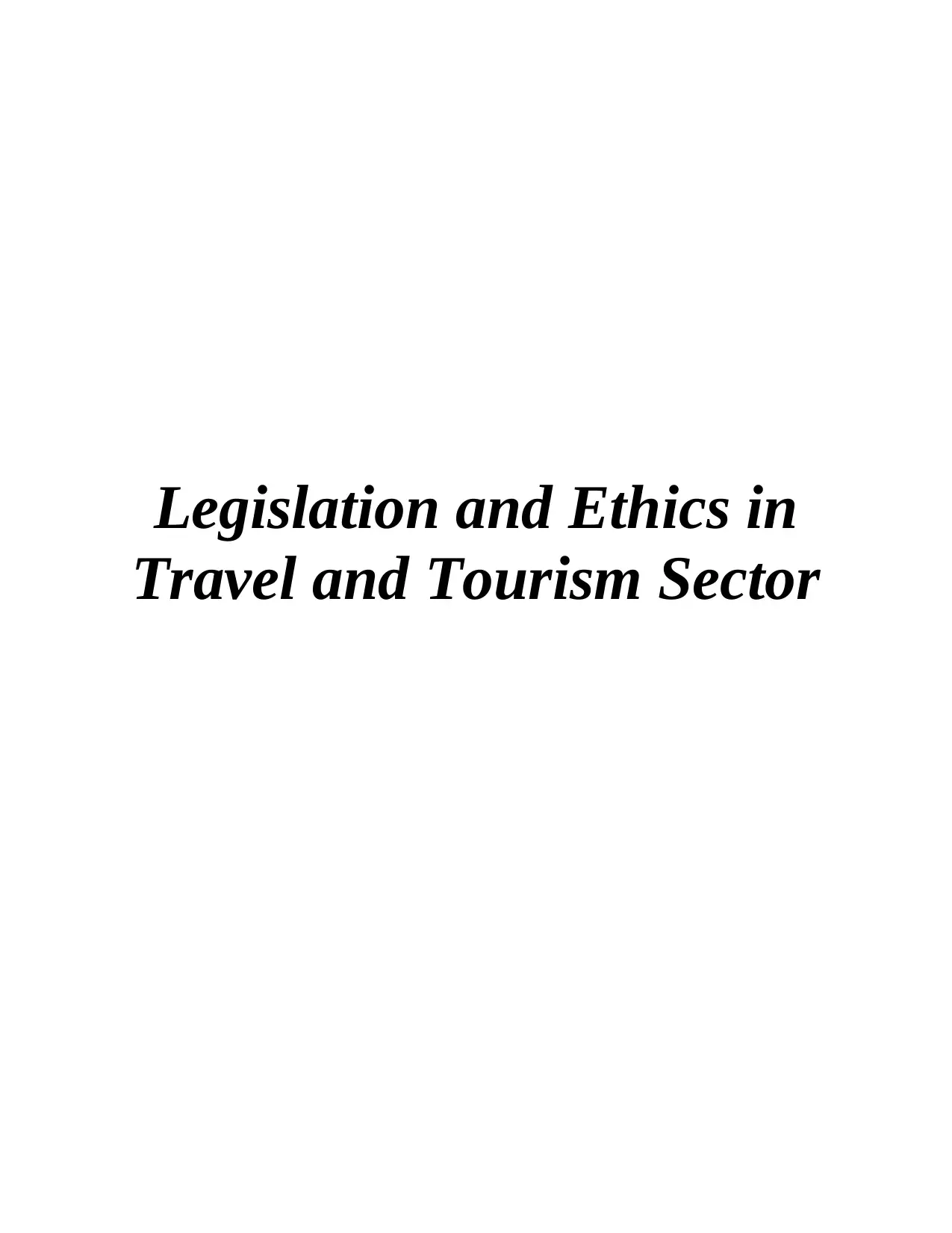
Legislation and Ethics in
Travel and Tourism Sector
Travel and Tourism Sector
Paraphrase This Document
Need a fresh take? Get an instant paraphrase of this document with our AI Paraphraser
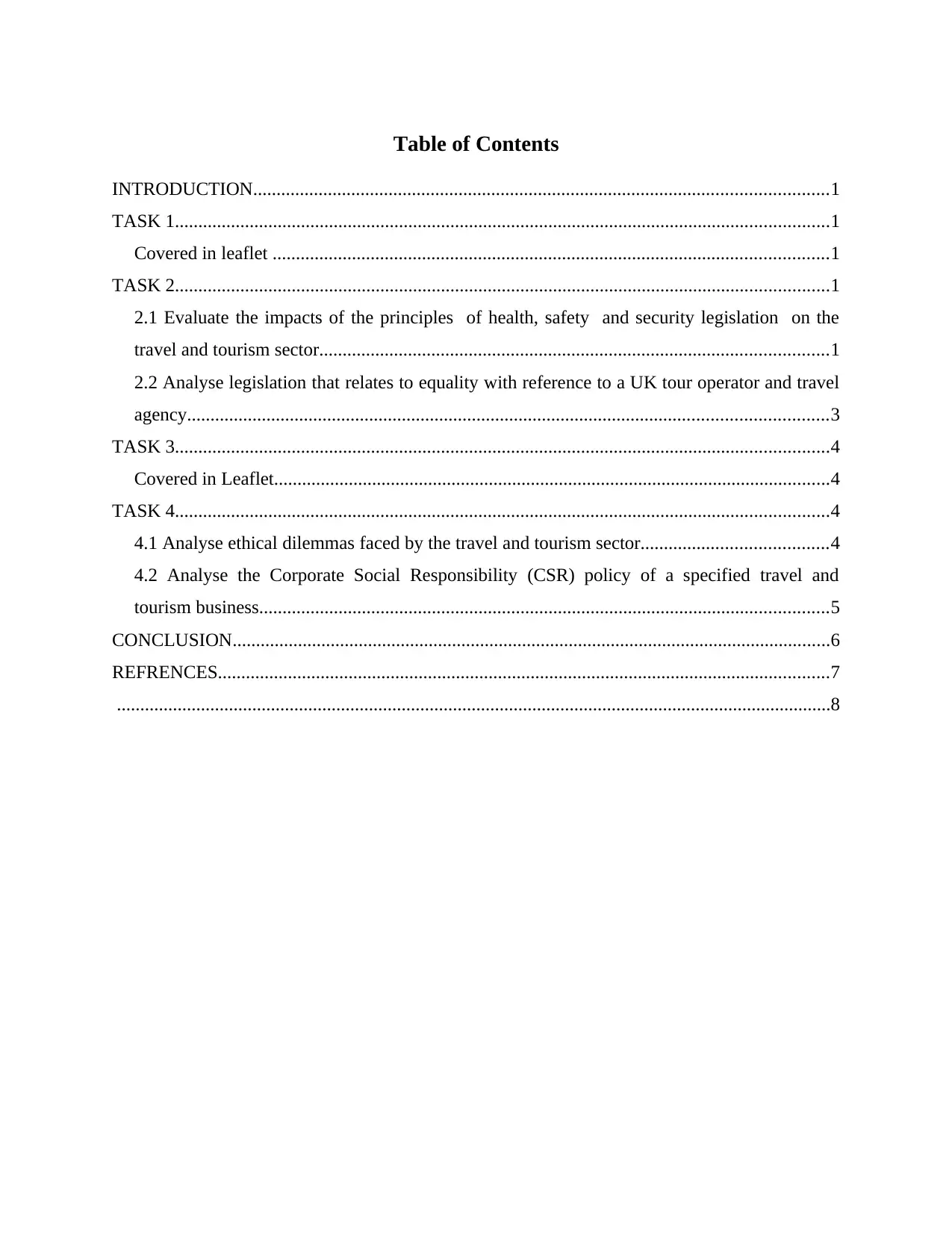
Table of Contents
INTRODUCTION...........................................................................................................................1
TASK 1............................................................................................................................................1
Covered in leaflet .......................................................................................................................1
TASK 2............................................................................................................................................1
2.1 Evaluate the impacts of the principles of health, safety and security legislation on the
travel and tourism sector.............................................................................................................1
2.2 Analyse legislation that relates to equality with reference to a UK tour operator and travel
agency.........................................................................................................................................3
TASK 3............................................................................................................................................4
Covered in Leaflet.......................................................................................................................4
TASK 4............................................................................................................................................4
4.1 Analyse ethical dilemmas faced by the travel and tourism sector........................................4
4.2 Analyse the Corporate Social Responsibility (CSR) policy of a specified travel and
tourism business..........................................................................................................................5
CONCLUSION................................................................................................................................6
REFRENCES...................................................................................................................................7
.........................................................................................................................................................8
INTRODUCTION...........................................................................................................................1
TASK 1............................................................................................................................................1
Covered in leaflet .......................................................................................................................1
TASK 2............................................................................................................................................1
2.1 Evaluate the impacts of the principles of health, safety and security legislation on the
travel and tourism sector.............................................................................................................1
2.2 Analyse legislation that relates to equality with reference to a UK tour operator and travel
agency.........................................................................................................................................3
TASK 3............................................................................................................................................4
Covered in Leaflet.......................................................................................................................4
TASK 4............................................................................................................................................4
4.1 Analyse ethical dilemmas faced by the travel and tourism sector........................................4
4.2 Analyse the Corporate Social Responsibility (CSR) policy of a specified travel and
tourism business..........................................................................................................................5
CONCLUSION................................................................................................................................6
REFRENCES...................................................................................................................................7
.........................................................................................................................................................8

⊘ This is a preview!⊘
Do you want full access?
Subscribe today to unlock all pages.

Trusted by 1+ million students worldwide
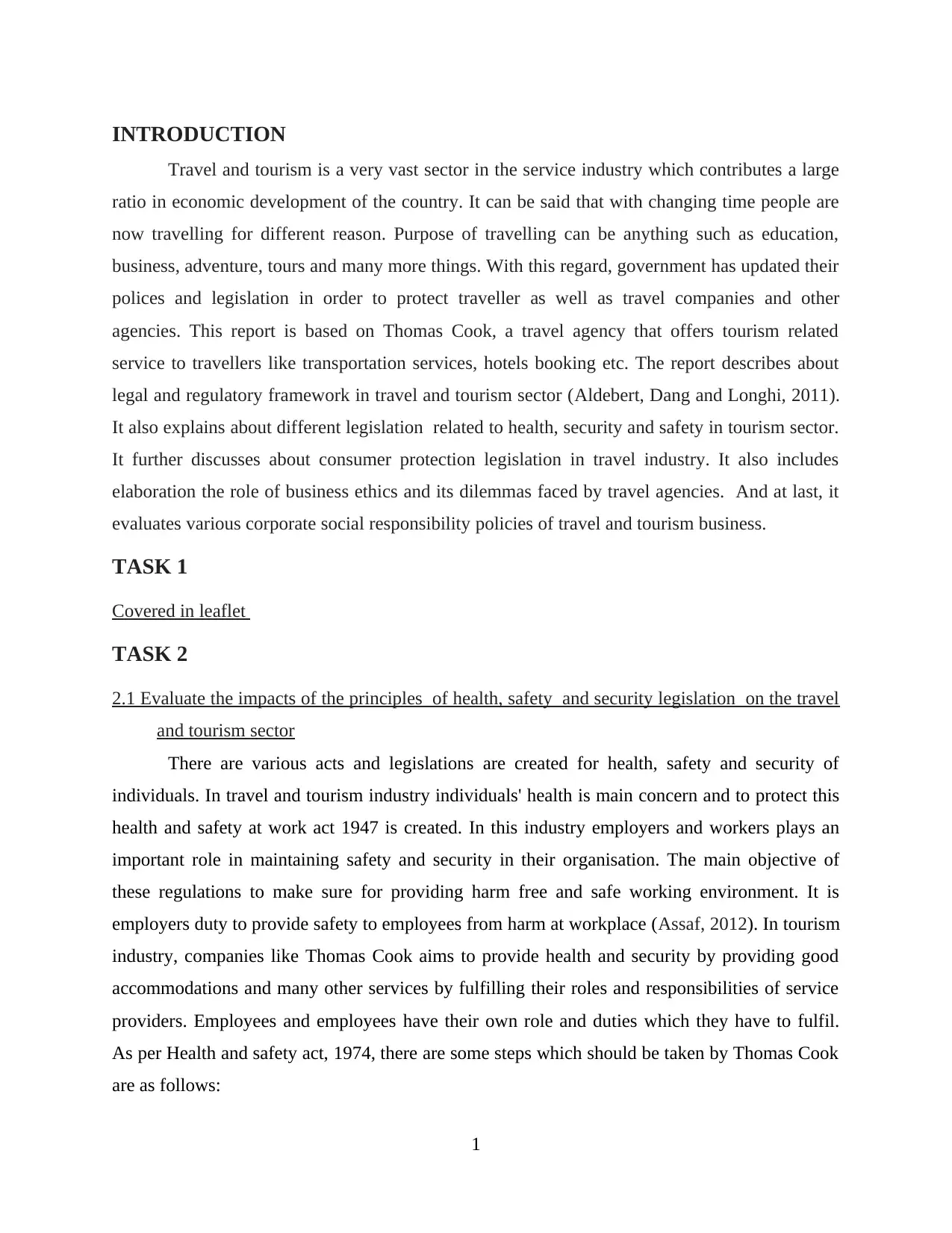
INTRODUCTION
Travel and tourism is a very vast sector in the service industry which contributes a large
ratio in economic development of the country. It can be said that with changing time people are
now travelling for different reason. Purpose of travelling can be anything such as education,
business, adventure, tours and many more things. With this regard, government has updated their
polices and legislation in order to protect traveller as well as travel companies and other
agencies. This report is based on Thomas Cook, a travel agency that offers tourism related
service to travellers like transportation services, hotels booking etc. The report describes about
legal and regulatory framework in travel and tourism sector (Aldebert, Dang and Longhi, 2011).
It also explains about different legislation related to health, security and safety in tourism sector.
It further discusses about consumer protection legislation in travel industry. It also includes
elaboration the role of business ethics and its dilemmas faced by travel agencies. And at last, it
evaluates various corporate social responsibility policies of travel and tourism business.
TASK 1
Covered in leaflet
TASK 2
2.1 Evaluate the impacts of the principles of health, safety and security legislation on the travel
and tourism sector
There are various acts and legislations are created for health, safety and security of
individuals. In travel and tourism industry individuals' health is main concern and to protect this
health and safety at work act 1947 is created. In this industry employers and workers plays an
important role in maintaining safety and security in their organisation. The main objective of
these regulations to make sure for providing harm free and safe working environment. It is
employers duty to provide safety to employees from harm at workplace (Assaf, 2012). In tourism
industry, companies like Thomas Cook aims to provide health and security by providing good
accommodations and many other services by fulfilling their roles and responsibilities of service
providers. Employees and employees have their own role and duties which they have to fulfil.
As per Health and safety act, 1974, there are some steps which should be taken by Thomas Cook
are as follows:
1
Travel and tourism is a very vast sector in the service industry which contributes a large
ratio in economic development of the country. It can be said that with changing time people are
now travelling for different reason. Purpose of travelling can be anything such as education,
business, adventure, tours and many more things. With this regard, government has updated their
polices and legislation in order to protect traveller as well as travel companies and other
agencies. This report is based on Thomas Cook, a travel agency that offers tourism related
service to travellers like transportation services, hotels booking etc. The report describes about
legal and regulatory framework in travel and tourism sector (Aldebert, Dang and Longhi, 2011).
It also explains about different legislation related to health, security and safety in tourism sector.
It further discusses about consumer protection legislation in travel industry. It also includes
elaboration the role of business ethics and its dilemmas faced by travel agencies. And at last, it
evaluates various corporate social responsibility policies of travel and tourism business.
TASK 1
Covered in leaflet
TASK 2
2.1 Evaluate the impacts of the principles of health, safety and security legislation on the travel
and tourism sector
There are various acts and legislations are created for health, safety and security of
individuals. In travel and tourism industry individuals' health is main concern and to protect this
health and safety at work act 1947 is created. In this industry employers and workers plays an
important role in maintaining safety and security in their organisation. The main objective of
these regulations to make sure for providing harm free and safe working environment. It is
employers duty to provide safety to employees from harm at workplace (Assaf, 2012). In tourism
industry, companies like Thomas Cook aims to provide health and security by providing good
accommodations and many other services by fulfilling their roles and responsibilities of service
providers. Employees and employees have their own role and duties which they have to fulfil.
As per Health and safety act, 1974, there are some steps which should be taken by Thomas Cook
are as follows:
1
Paraphrase This Document
Need a fresh take? Get an instant paraphrase of this document with our AI Paraphraser
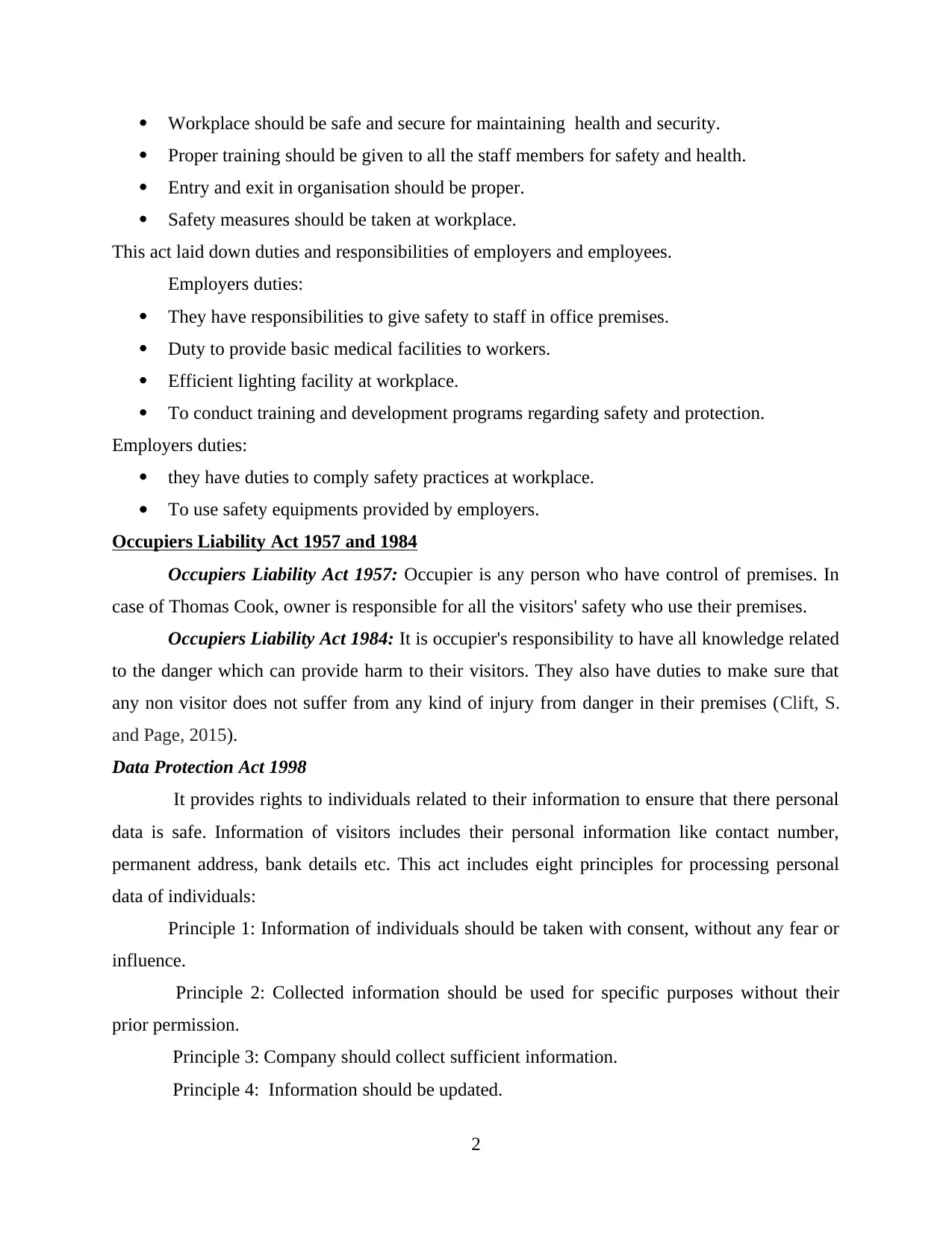
Workplace should be safe and secure for maintaining health and security.
Proper training should be given to all the staff members for safety and health.
Entry and exit in organisation should be proper.
Safety measures should be taken at workplace.
This act laid down duties and responsibilities of employers and employees.
Employers duties:
They have responsibilities to give safety to staff in office premises.
Duty to provide basic medical facilities to workers.
Efficient lighting facility at workplace.
To conduct training and development programs regarding safety and protection.
Employers duties:
they have duties to comply safety practices at workplace.
To use safety equipments provided by employers.
Occupiers Liability Act 1957 and 1984
Occupiers Liability Act 1957: Occupier is any person who have control of premises. In
case of Thomas Cook, owner is responsible for all the visitors' safety who use their premises.
Occupiers Liability Act 1984: It is occupier's responsibility to have all knowledge related
to the danger which can provide harm to their visitors. They also have duties to make sure that
any non visitor does not suffer from any kind of injury from danger in their premises (Clift, S.
and Page, 2015).
Data Protection Act 1998
It provides rights to individuals related to their information to ensure that there personal
data is safe. Information of visitors includes their personal information like contact number,
permanent address, bank details etc. This act includes eight principles for processing personal
data of individuals:
Principle 1: Information of individuals should be taken with consent, without any fear or
influence.
Principle 2: Collected information should be used for specific purposes without their
prior permission.
Principle 3: Company should collect sufficient information.
Principle 4: Information should be updated.
2
Proper training should be given to all the staff members for safety and health.
Entry and exit in organisation should be proper.
Safety measures should be taken at workplace.
This act laid down duties and responsibilities of employers and employees.
Employers duties:
They have responsibilities to give safety to staff in office premises.
Duty to provide basic medical facilities to workers.
Efficient lighting facility at workplace.
To conduct training and development programs regarding safety and protection.
Employers duties:
they have duties to comply safety practices at workplace.
To use safety equipments provided by employers.
Occupiers Liability Act 1957 and 1984
Occupiers Liability Act 1957: Occupier is any person who have control of premises. In
case of Thomas Cook, owner is responsible for all the visitors' safety who use their premises.
Occupiers Liability Act 1984: It is occupier's responsibility to have all knowledge related
to the danger which can provide harm to their visitors. They also have duties to make sure that
any non visitor does not suffer from any kind of injury from danger in their premises (Clift, S.
and Page, 2015).
Data Protection Act 1998
It provides rights to individuals related to their information to ensure that there personal
data is safe. Information of visitors includes their personal information like contact number,
permanent address, bank details etc. This act includes eight principles for processing personal
data of individuals:
Principle 1: Information of individuals should be taken with consent, without any fear or
influence.
Principle 2: Collected information should be used for specific purposes without their
prior permission.
Principle 3: Company should collect sufficient information.
Principle 4: Information should be updated.
2
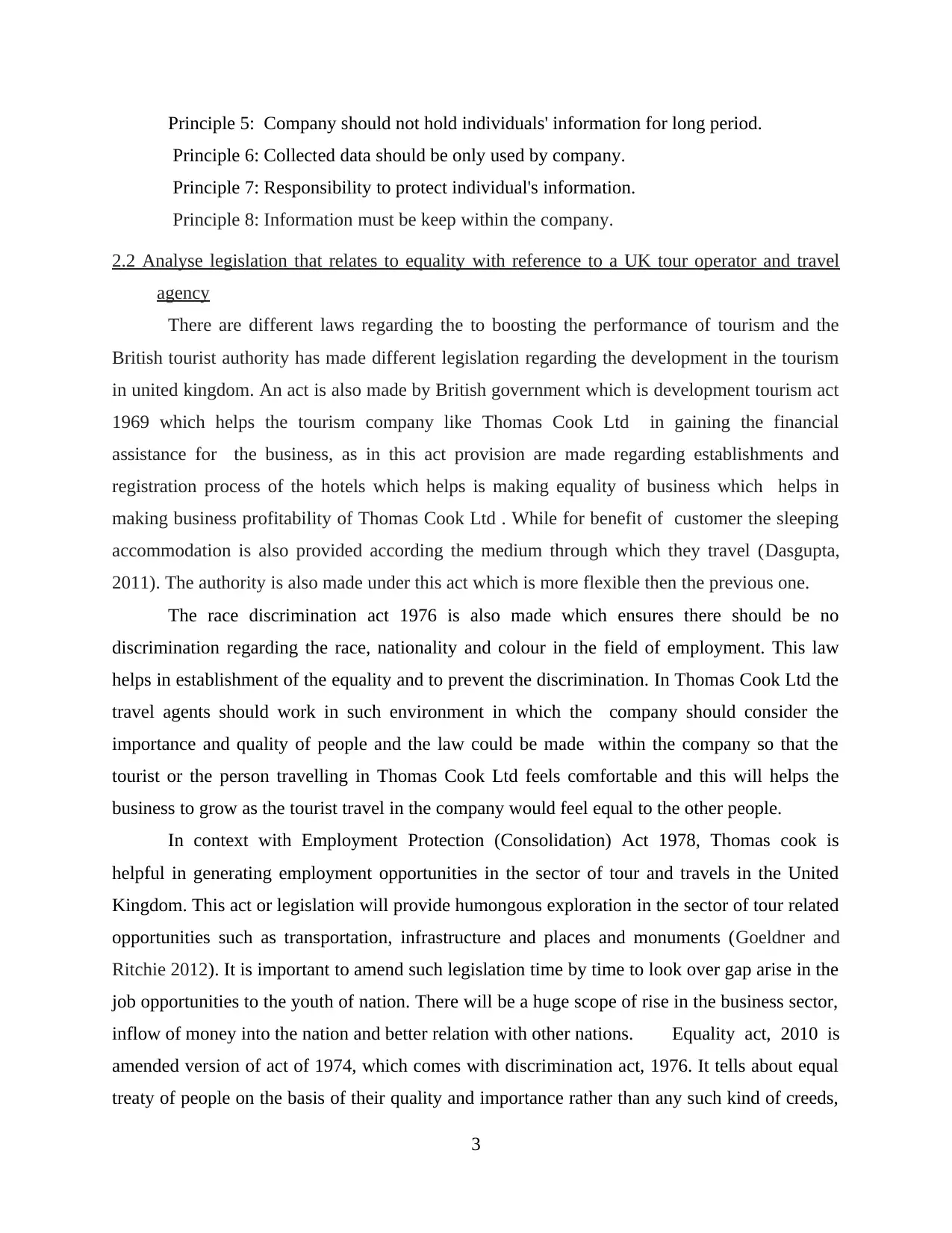
Principle 5: Company should not hold individuals' information for long period.
Principle 6: Collected data should be only used by company.
Principle 7: Responsibility to protect individual's information.
Principle 8: Information must be keep within the company.
2.2 Analyse legislation that relates to equality with reference to a UK tour operator and travel
agency
There are different laws regarding the to boosting the performance of tourism and the
British tourist authority has made different legislation regarding the development in the tourism
in united kingdom. An act is also made by British government which is development tourism act
1969 which helps the tourism company like Thomas Cook Ltd in gaining the financial
assistance for the business, as in this act provision are made regarding establishments and
registration process of the hotels which helps is making equality of business which helps in
making business profitability of Thomas Cook Ltd . While for benefit of customer the sleeping
accommodation is also provided according the medium through which they travel (Dasgupta,
2011). The authority is also made under this act which is more flexible then the previous one.
The race discrimination act 1976 is also made which ensures there should be no
discrimination regarding the race, nationality and colour in the field of employment. This law
helps in establishment of the equality and to prevent the discrimination. In Thomas Cook Ltd the
travel agents should work in such environment in which the company should consider the
importance and quality of people and the law could be made within the company so that the
tourist or the person travelling in Thomas Cook Ltd feels comfortable and this will helps the
business to grow as the tourist travel in the company would feel equal to the other people.
In context with Employment Protection (Consolidation) Act 1978, Thomas cook is
helpful in generating employment opportunities in the sector of tour and travels in the United
Kingdom. This act or legislation will provide humongous exploration in the sector of tour related
opportunities such as transportation, infrastructure and places and monuments (Goeldner and
Ritchie 2012). It is important to amend such legislation time by time to look over gap arise in the
job opportunities to the youth of nation. There will be a huge scope of rise in the business sector,
inflow of money into the nation and better relation with other nations. Equality act, 2010 is
amended version of act of 1974, which comes with discrimination act, 1976. It tells about equal
treaty of people on the basis of their quality and importance rather than any such kind of creeds,
3
Principle 6: Collected data should be only used by company.
Principle 7: Responsibility to protect individual's information.
Principle 8: Information must be keep within the company.
2.2 Analyse legislation that relates to equality with reference to a UK tour operator and travel
agency
There are different laws regarding the to boosting the performance of tourism and the
British tourist authority has made different legislation regarding the development in the tourism
in united kingdom. An act is also made by British government which is development tourism act
1969 which helps the tourism company like Thomas Cook Ltd in gaining the financial
assistance for the business, as in this act provision are made regarding establishments and
registration process of the hotels which helps is making equality of business which helps in
making business profitability of Thomas Cook Ltd . While for benefit of customer the sleeping
accommodation is also provided according the medium through which they travel (Dasgupta,
2011). The authority is also made under this act which is more flexible then the previous one.
The race discrimination act 1976 is also made which ensures there should be no
discrimination regarding the race, nationality and colour in the field of employment. This law
helps in establishment of the equality and to prevent the discrimination. In Thomas Cook Ltd the
travel agents should work in such environment in which the company should consider the
importance and quality of people and the law could be made within the company so that the
tourist or the person travelling in Thomas Cook Ltd feels comfortable and this will helps the
business to grow as the tourist travel in the company would feel equal to the other people.
In context with Employment Protection (Consolidation) Act 1978, Thomas cook is
helpful in generating employment opportunities in the sector of tour and travels in the United
Kingdom. This act or legislation will provide humongous exploration in the sector of tour related
opportunities such as transportation, infrastructure and places and monuments (Goeldner and
Ritchie 2012). It is important to amend such legislation time by time to look over gap arise in the
job opportunities to the youth of nation. There will be a huge scope of rise in the business sector,
inflow of money into the nation and better relation with other nations. Equality act, 2010 is
amended version of act of 1974, which comes with discrimination act, 1976. It tells about equal
treaty of people on the basis of their quality and importance rather than any such kind of creeds,
3
⊘ This is a preview!⊘
Do you want full access?
Subscribe today to unlock all pages.

Trusted by 1+ million students worldwide
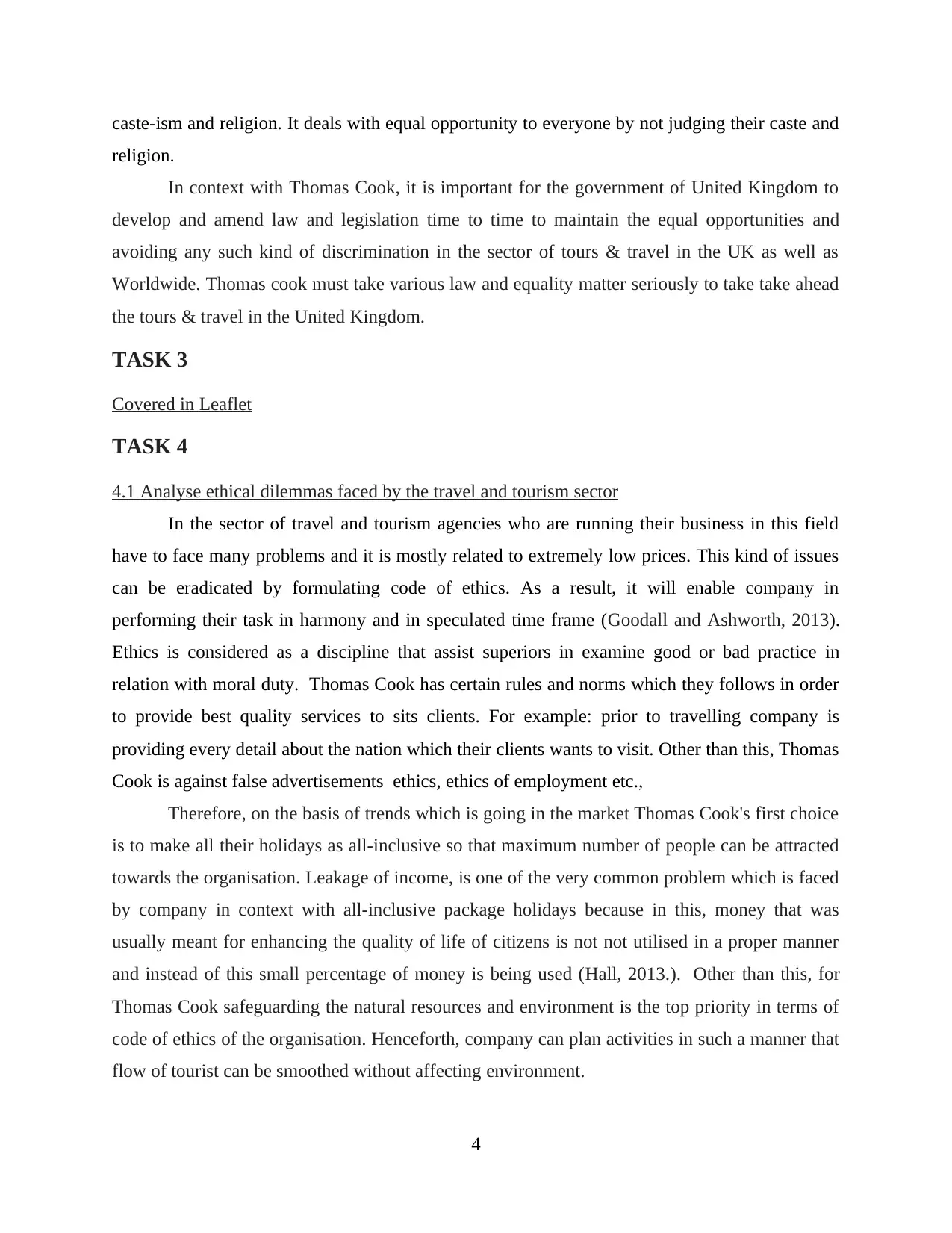
caste-ism and religion. It deals with equal opportunity to everyone by not judging their caste and
religion.
In context with Thomas Cook, it is important for the government of United Kingdom to
develop and amend law and legislation time to time to maintain the equal opportunities and
avoiding any such kind of discrimination in the sector of tours & travel in the UK as well as
Worldwide. Thomas cook must take various law and equality matter seriously to take take ahead
the tours & travel in the United Kingdom.
TASK 3
Covered in Leaflet
TASK 4
4.1 Analyse ethical dilemmas faced by the travel and tourism sector
In the sector of travel and tourism agencies who are running their business in this field
have to face many problems and it is mostly related to extremely low prices. This kind of issues
can be eradicated by formulating code of ethics. As a result, it will enable company in
performing their task in harmony and in speculated time frame (Goodall and Ashworth, 2013).
Ethics is considered as a discipline that assist superiors in examine good or bad practice in
relation with moral duty. Thomas Cook has certain rules and norms which they follows in order
to provide best quality services to sits clients. For example: prior to travelling company is
providing every detail about the nation which their clients wants to visit. Other than this, Thomas
Cook is against false advertisements ethics, ethics of employment etc.,
Therefore, on the basis of trends which is going in the market Thomas Cook's first choice
is to make all their holidays as all-inclusive so that maximum number of people can be attracted
towards the organisation. Leakage of income, is one of the very common problem which is faced
by company in context with all-inclusive package holidays because in this, money that was
usually meant for enhancing the quality of life of citizens is not not utilised in a proper manner
and instead of this small percentage of money is being used (Hall, 2013.). Other than this, for
Thomas Cook safeguarding the natural resources and environment is the top priority in terms of
code of ethics of the organisation. Henceforth, company can plan activities in such a manner that
flow of tourist can be smoothed without affecting environment.
4
religion.
In context with Thomas Cook, it is important for the government of United Kingdom to
develop and amend law and legislation time to time to maintain the equal opportunities and
avoiding any such kind of discrimination in the sector of tours & travel in the UK as well as
Worldwide. Thomas cook must take various law and equality matter seriously to take take ahead
the tours & travel in the United Kingdom.
TASK 3
Covered in Leaflet
TASK 4
4.1 Analyse ethical dilemmas faced by the travel and tourism sector
In the sector of travel and tourism agencies who are running their business in this field
have to face many problems and it is mostly related to extremely low prices. This kind of issues
can be eradicated by formulating code of ethics. As a result, it will enable company in
performing their task in harmony and in speculated time frame (Goodall and Ashworth, 2013).
Ethics is considered as a discipline that assist superiors in examine good or bad practice in
relation with moral duty. Thomas Cook has certain rules and norms which they follows in order
to provide best quality services to sits clients. For example: prior to travelling company is
providing every detail about the nation which their clients wants to visit. Other than this, Thomas
Cook is against false advertisements ethics, ethics of employment etc.,
Therefore, on the basis of trends which is going in the market Thomas Cook's first choice
is to make all their holidays as all-inclusive so that maximum number of people can be attracted
towards the organisation. Leakage of income, is one of the very common problem which is faced
by company in context with all-inclusive package holidays because in this, money that was
usually meant for enhancing the quality of life of citizens is not not utilised in a proper manner
and instead of this small percentage of money is being used (Hall, 2013.). Other than this, for
Thomas Cook safeguarding the natural resources and environment is the top priority in terms of
code of ethics of the organisation. Henceforth, company can plan activities in such a manner that
flow of tourist can be smoothed without affecting environment.
4
Paraphrase This Document
Need a fresh take? Get an instant paraphrase of this document with our AI Paraphraser
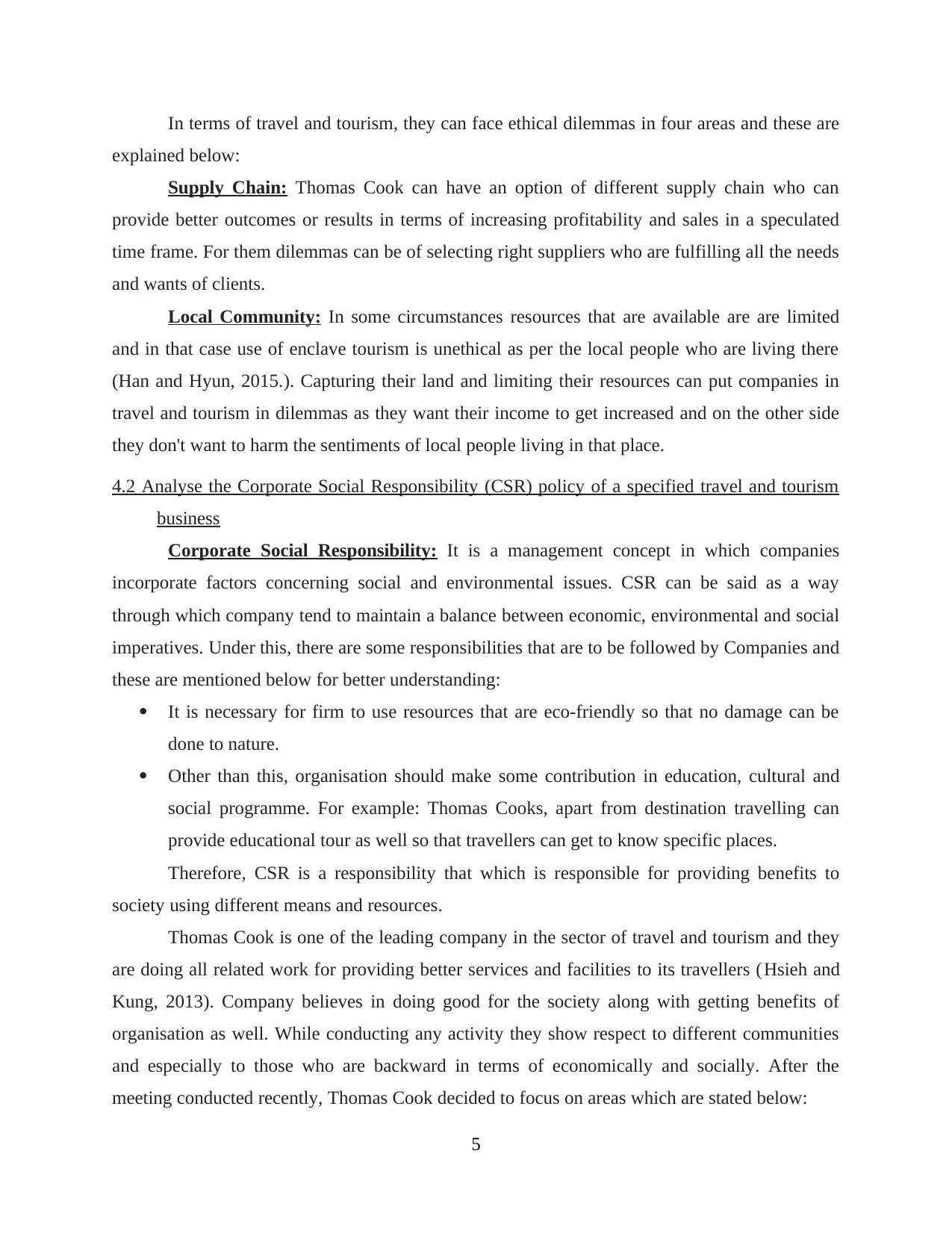
In terms of travel and tourism, they can face ethical dilemmas in four areas and these are
explained below:
Supply Chain: Thomas Cook can have an option of different supply chain who can
provide better outcomes or results in terms of increasing profitability and sales in a speculated
time frame. For them dilemmas can be of selecting right suppliers who are fulfilling all the needs
and wants of clients.
Local Community: In some circumstances resources that are available are are limited
and in that case use of enclave tourism is unethical as per the local people who are living there
(Han and Hyun, 2015.). Capturing their land and limiting their resources can put companies in
travel and tourism in dilemmas as they want their income to get increased and on the other side
they don't want to harm the sentiments of local people living in that place.
4.2 Analyse the Corporate Social Responsibility (CSR) policy of a specified travel and tourism
business
Corporate Social Responsibility: It is a management concept in which companies
incorporate factors concerning social and environmental issues. CSR can be said as a way
through which company tend to maintain a balance between economic, environmental and social
imperatives. Under this, there are some responsibilities that are to be followed by Companies and
these are mentioned below for better understanding:
It is necessary for firm to use resources that are eco-friendly so that no damage can be
done to nature.
Other than this, organisation should make some contribution in education, cultural and
social programme. For example: Thomas Cooks, apart from destination travelling can
provide educational tour as well so that travellers can get to know specific places.
Therefore, CSR is a responsibility that which is responsible for providing benefits to
society using different means and resources.
Thomas Cook is one of the leading company in the sector of travel and tourism and they
are doing all related work for providing better services and facilities to its travellers (Hsieh and
Kung, 2013). Company believes in doing good for the society along with getting benefits of
organisation as well. While conducting any activity they show respect to different communities
and especially to those who are backward in terms of economically and socially. After the
meeting conducted recently, Thomas Cook decided to focus on areas which are stated below:
5
explained below:
Supply Chain: Thomas Cook can have an option of different supply chain who can
provide better outcomes or results in terms of increasing profitability and sales in a speculated
time frame. For them dilemmas can be of selecting right suppliers who are fulfilling all the needs
and wants of clients.
Local Community: In some circumstances resources that are available are are limited
and in that case use of enclave tourism is unethical as per the local people who are living there
(Han and Hyun, 2015.). Capturing their land and limiting their resources can put companies in
travel and tourism in dilemmas as they want their income to get increased and on the other side
they don't want to harm the sentiments of local people living in that place.
4.2 Analyse the Corporate Social Responsibility (CSR) policy of a specified travel and tourism
business
Corporate Social Responsibility: It is a management concept in which companies
incorporate factors concerning social and environmental issues. CSR can be said as a way
through which company tend to maintain a balance between economic, environmental and social
imperatives. Under this, there are some responsibilities that are to be followed by Companies and
these are mentioned below for better understanding:
It is necessary for firm to use resources that are eco-friendly so that no damage can be
done to nature.
Other than this, organisation should make some contribution in education, cultural and
social programme. For example: Thomas Cooks, apart from destination travelling can
provide educational tour as well so that travellers can get to know specific places.
Therefore, CSR is a responsibility that which is responsible for providing benefits to
society using different means and resources.
Thomas Cook is one of the leading company in the sector of travel and tourism and they
are doing all related work for providing better services and facilities to its travellers (Hsieh and
Kung, 2013). Company believes in doing good for the society along with getting benefits of
organisation as well. While conducting any activity they show respect to different communities
and especially to those who are backward in terms of economically and socially. After the
meeting conducted recently, Thomas Cook decided to focus on areas which are stated below:
5
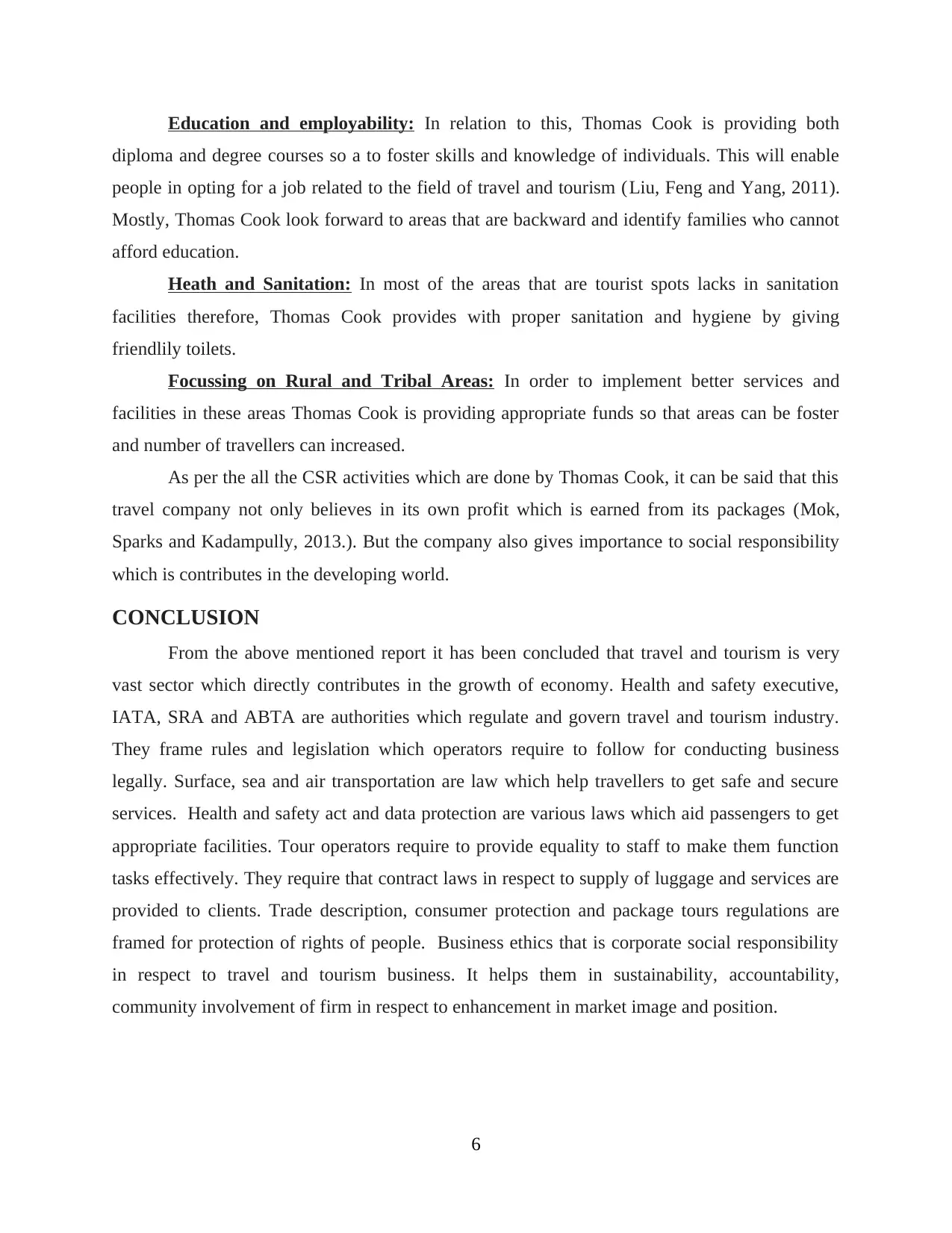
Education and employability: In relation to this, Thomas Cook is providing both
diploma and degree courses so a to foster skills and knowledge of individuals. This will enable
people in opting for a job related to the field of travel and tourism (Liu, Feng and Yang, 2011).
Mostly, Thomas Cook look forward to areas that are backward and identify families who cannot
afford education.
Heath and Sanitation: In most of the areas that are tourist spots lacks in sanitation
facilities therefore, Thomas Cook provides with proper sanitation and hygiene by giving
friendlily toilets.
Focussing on Rural and Tribal Areas: In order to implement better services and
facilities in these areas Thomas Cook is providing appropriate funds so that areas can be foster
and number of travellers can increased.
As per the all the CSR activities which are done by Thomas Cook, it can be said that this
travel company not only believes in its own profit which is earned from its packages (Mok,
Sparks and Kadampully, 2013.). But the company also gives importance to social responsibility
which is contributes in the developing world.
CONCLUSION
From the above mentioned report it has been concluded that travel and tourism is very
vast sector which directly contributes in the growth of economy. Health and safety executive,
IATA, SRA and ABTA are authorities which regulate and govern travel and tourism industry.
They frame rules and legislation which operators require to follow for conducting business
legally. Surface, sea and air transportation are law which help travellers to get safe and secure
services. Health and safety act and data protection are various laws which aid passengers to get
appropriate facilities. Tour operators require to provide equality to staff to make them function
tasks effectively. They require that contract laws in respect to supply of luggage and services are
provided to clients. Trade description, consumer protection and package tours regulations are
framed for protection of rights of people. Business ethics that is corporate social responsibility
in respect to travel and tourism business. It helps them in sustainability, accountability,
community involvement of firm in respect to enhancement in market image and position.
6
diploma and degree courses so a to foster skills and knowledge of individuals. This will enable
people in opting for a job related to the field of travel and tourism (Liu, Feng and Yang, 2011).
Mostly, Thomas Cook look forward to areas that are backward and identify families who cannot
afford education.
Heath and Sanitation: In most of the areas that are tourist spots lacks in sanitation
facilities therefore, Thomas Cook provides with proper sanitation and hygiene by giving
friendlily toilets.
Focussing on Rural and Tribal Areas: In order to implement better services and
facilities in these areas Thomas Cook is providing appropriate funds so that areas can be foster
and number of travellers can increased.
As per the all the CSR activities which are done by Thomas Cook, it can be said that this
travel company not only believes in its own profit which is earned from its packages (Mok,
Sparks and Kadampully, 2013.). But the company also gives importance to social responsibility
which is contributes in the developing world.
CONCLUSION
From the above mentioned report it has been concluded that travel and tourism is very
vast sector which directly contributes in the growth of economy. Health and safety executive,
IATA, SRA and ABTA are authorities which regulate and govern travel and tourism industry.
They frame rules and legislation which operators require to follow for conducting business
legally. Surface, sea and air transportation are law which help travellers to get safe and secure
services. Health and safety act and data protection are various laws which aid passengers to get
appropriate facilities. Tour operators require to provide equality to staff to make them function
tasks effectively. They require that contract laws in respect to supply of luggage and services are
provided to clients. Trade description, consumer protection and package tours regulations are
framed for protection of rights of people. Business ethics that is corporate social responsibility
in respect to travel and tourism business. It helps them in sustainability, accountability,
community involvement of firm in respect to enhancement in market image and position.
6
⊘ This is a preview!⊘
Do you want full access?
Subscribe today to unlock all pages.

Trusted by 1+ million students worldwide
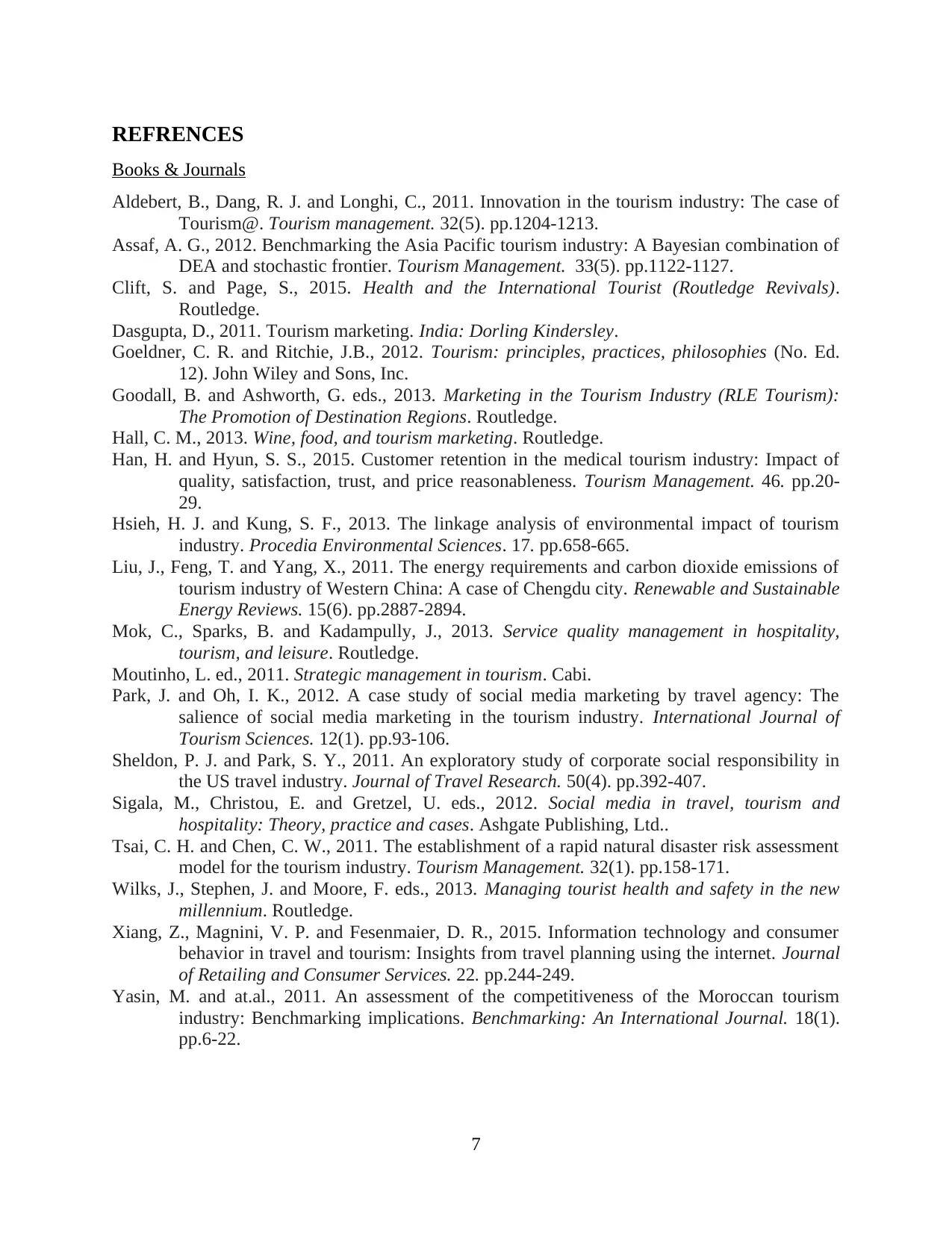
REFRENCES
Books & Journals
Aldebert, B., Dang, R. J. and Longhi, C., 2011. Innovation in the tourism industry: The case of
Tourism@. Tourism management. 32(5). pp.1204-1213.
Assaf, A. G., 2012. Benchmarking the Asia Pacific tourism industry: A Bayesian combination of
DEA and stochastic frontier. Tourism Management. 33(5). pp.1122-1127.
Clift, S. and Page, S., 2015. Health and the International Tourist (Routledge Revivals).
Routledge.
Dasgupta, D., 2011. Tourism marketing. India: Dorling Kindersley.
Goeldner, C. R. and Ritchie, J.B., 2012. Tourism: principles, practices, philosophies (No. Ed.
12). John Wiley and Sons, Inc.
Goodall, B. and Ashworth, G. eds., 2013. Marketing in the Tourism Industry (RLE Tourism):
The Promotion of Destination Regions. Routledge.
Hall, C. M., 2013. Wine, food, and tourism marketing. Routledge.
Han, H. and Hyun, S. S., 2015. Customer retention in the medical tourism industry: Impact of
quality, satisfaction, trust, and price reasonableness. Tourism Management. 46. pp.20-
29.
Hsieh, H. J. and Kung, S. F., 2013. The linkage analysis of environmental impact of tourism
industry. Procedia Environmental Sciences. 17. pp.658-665.
Liu, J., Feng, T. and Yang, X., 2011. The energy requirements and carbon dioxide emissions of
tourism industry of Western China: A case of Chengdu city. Renewable and Sustainable
Energy Reviews. 15(6). pp.2887-2894.
Mok, C., Sparks, B. and Kadampully, J., 2013. Service quality management in hospitality,
tourism, and leisure. Routledge.
Moutinho, L. ed., 2011. Strategic management in tourism. Cabi.
Park, J. and Oh, I. K., 2012. A case study of social media marketing by travel agency: The
salience of social media marketing in the tourism industry. International Journal of
Tourism Sciences. 12(1). pp.93-106.
Sheldon, P. J. and Park, S. Y., 2011. An exploratory study of corporate social responsibility in
the US travel industry. Journal of Travel Research. 50(4). pp.392-407.
Sigala, M., Christou, E. and Gretzel, U. eds., 2012. Social media in travel, tourism and
hospitality: Theory, practice and cases. Ashgate Publishing, Ltd..
Tsai, C. H. and Chen, C. W., 2011. The establishment of a rapid natural disaster risk assessment
model for the tourism industry. Tourism Management. 32(1). pp.158-171.
Wilks, J., Stephen, J. and Moore, F. eds., 2013. Managing tourist health and safety in the new
millennium. Routledge.
Xiang, Z., Magnini, V. P. and Fesenmaier, D. R., 2015. Information technology and consumer
behavior in travel and tourism: Insights from travel planning using the internet. Journal
of Retailing and Consumer Services. 22. pp.244-249.
Yasin, M. and at.al., 2011. An assessment of the competitiveness of the Moroccan tourism
industry: Benchmarking implications. Benchmarking: An International Journal. 18(1).
pp.6-22.
7
Books & Journals
Aldebert, B., Dang, R. J. and Longhi, C., 2011. Innovation in the tourism industry: The case of
Tourism@. Tourism management. 32(5). pp.1204-1213.
Assaf, A. G., 2012. Benchmarking the Asia Pacific tourism industry: A Bayesian combination of
DEA and stochastic frontier. Tourism Management. 33(5). pp.1122-1127.
Clift, S. and Page, S., 2015. Health and the International Tourist (Routledge Revivals).
Routledge.
Dasgupta, D., 2011. Tourism marketing. India: Dorling Kindersley.
Goeldner, C. R. and Ritchie, J.B., 2012. Tourism: principles, practices, philosophies (No. Ed.
12). John Wiley and Sons, Inc.
Goodall, B. and Ashworth, G. eds., 2013. Marketing in the Tourism Industry (RLE Tourism):
The Promotion of Destination Regions. Routledge.
Hall, C. M., 2013. Wine, food, and tourism marketing. Routledge.
Han, H. and Hyun, S. S., 2015. Customer retention in the medical tourism industry: Impact of
quality, satisfaction, trust, and price reasonableness. Tourism Management. 46. pp.20-
29.
Hsieh, H. J. and Kung, S. F., 2013. The linkage analysis of environmental impact of tourism
industry. Procedia Environmental Sciences. 17. pp.658-665.
Liu, J., Feng, T. and Yang, X., 2011. The energy requirements and carbon dioxide emissions of
tourism industry of Western China: A case of Chengdu city. Renewable and Sustainable
Energy Reviews. 15(6). pp.2887-2894.
Mok, C., Sparks, B. and Kadampully, J., 2013. Service quality management in hospitality,
tourism, and leisure. Routledge.
Moutinho, L. ed., 2011. Strategic management in tourism. Cabi.
Park, J. and Oh, I. K., 2012. A case study of social media marketing by travel agency: The
salience of social media marketing in the tourism industry. International Journal of
Tourism Sciences. 12(1). pp.93-106.
Sheldon, P. J. and Park, S. Y., 2011. An exploratory study of corporate social responsibility in
the US travel industry. Journal of Travel Research. 50(4). pp.392-407.
Sigala, M., Christou, E. and Gretzel, U. eds., 2012. Social media in travel, tourism and
hospitality: Theory, practice and cases. Ashgate Publishing, Ltd..
Tsai, C. H. and Chen, C. W., 2011. The establishment of a rapid natural disaster risk assessment
model for the tourism industry. Tourism Management. 32(1). pp.158-171.
Wilks, J., Stephen, J. and Moore, F. eds., 2013. Managing tourist health and safety in the new
millennium. Routledge.
Xiang, Z., Magnini, V. P. and Fesenmaier, D. R., 2015. Information technology and consumer
behavior in travel and tourism: Insights from travel planning using the internet. Journal
of Retailing and Consumer Services. 22. pp.244-249.
Yasin, M. and at.al., 2011. An assessment of the competitiveness of the Moroccan tourism
industry: Benchmarking implications. Benchmarking: An International Journal. 18(1).
pp.6-22.
7
Paraphrase This Document
Need a fresh take? Get an instant paraphrase of this document with our AI Paraphraser

8
1 out of 11
Related Documents
Your All-in-One AI-Powered Toolkit for Academic Success.
+13062052269
info@desklib.com
Available 24*7 on WhatsApp / Email
![[object Object]](/_next/static/media/star-bottom.7253800d.svg)
Unlock your academic potential
Copyright © 2020–2026 A2Z Services. All Rights Reserved. Developed and managed by ZUCOL.




